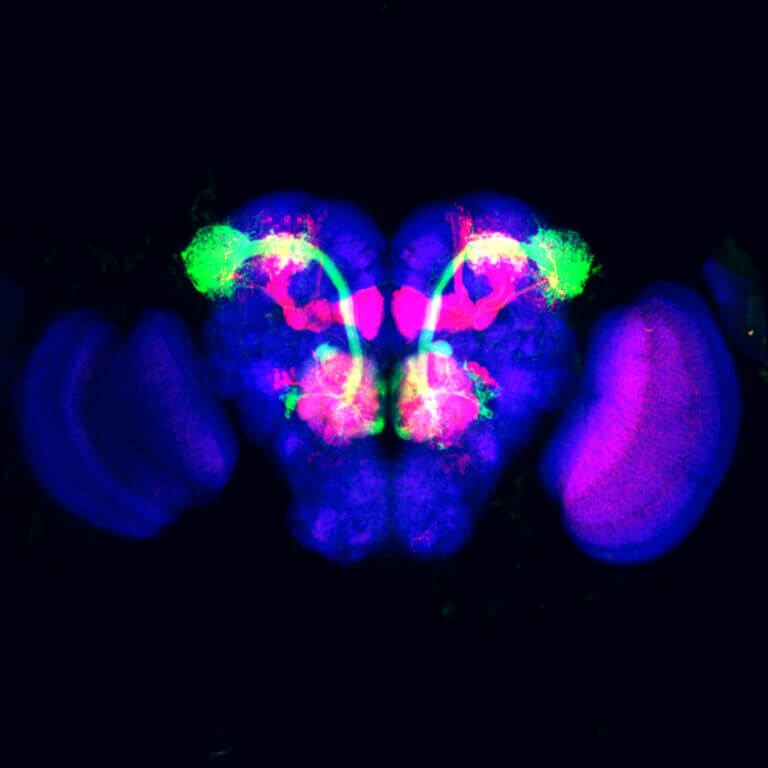A story about a protein that doesn't feel electric voltage

The sensory receptors in our body receive stimuli from the environment regularly. These stimuli become information (signals) that is transmitted via nerve cells to different areas of the brain, where it is received at intermediate stations and processed and finally dissipated or stored, according to its content and degree of importance. The nerve cells are able to communicate with each other through the synapses (the meeting area between a nerve cell and its target cell, where the nerve information passes). Brain flexibility (or by its other name: neural plasticity) is expressed in the ability of nerve cells to form new connections with each other, and thus, among other things, to influence behavior.
Dr. Moshe Ferns from the Laboratory for Neural Circuits and Olfactory Perception at Tel Aviv University and his team are investigating, in the fruit fly "Drosophila", how the brain encodes the information that reaches it from the senses, and translates it into behavior. That is, how it receives input (sensory stimulation) and produces output (response).
"Our brain reacts to the changing environment and we want to understand how it does this through the olfactory system" says Dr. Frans. "We have 400 types of input cells in the nose - and we are trying to understand how their activation encodes information in the brain and leads to a certain behavior."
In the meantime, Dr. Frans and his team are researching G protein-coupled receptors - proteins whose activation causes a chain of chemical reactions inside the cell (signal transduction pathway). These proteins are very common in the brain and are involved in almost every brain activity (such as learning and memory). In the past, Prof. Hana Farnes and Prof. Yitzhak Farnes (the researcher's parents) discovered that these receptors can sense electrical voltage in cells. But until now it was not known if changes in them, such as eliminating their ability to sense electrical voltage, affect the brain and behavior.
To answer this question, Dr. Frans and his team decided to focus on one receptor from the family of G protein-coupled receptors (called muscarinic type A). There is already a lot of information about this receptor in the scientific literature, and among other things, the location of its voltage sensor and how it can be changed is known. The researchers changed the genetic sequence of the flies using a gene editing system (Crisper technology), so that the muscarinic receptor could not sense electrical voltage in nerve cells in the brain, and then examined how this affects the function and behavior of the flies. This, compared to flies that did not undergo any manipulation (control group).
The neurons in which the voltage sensor of the muscarinic receptor was abolished were those involved in the process of getting used to the smell - a process in which the intensity of the response to the smell decreases following continuous exposure to it, which indicates normal brain flexibility. So, for example, a few minutes after entering a room with a good or bad smell, we stop smelling it.
The researchers discovered that the elimination of the voltage sensor of the muscarinic receptor, as well as the elimination of its electrical voltage sensing inside the cell, causes the elimination of the cerebral flexibility of the flies; "We found that the muscarinic receptor is very involved in strengthening the intercellular connection in the brain," says Prof. Frans. "This is a much more significant involvement than we thought; When we disabled his sensor, the connection between the neurons failed to strengthen. Usually, when cell A is active - cell B is more active. But now we have seen that cell B does not change its activity, and the rest remains static", explains Dr. Farnes.
In the behavioral experiments of the flies, which won a research grant from the National Science Foundation, the researchers discovered that the result of eliminating brain flexibility is the destruction of the habituation process to the smell; They closed the flies in special cells where on the one hand smell flows and on the other air. There are 20 cells in each of which there is a single fly. They infused the cells with a pungent odor for half an hour and noticed that the test flies regularly moved away from it (that is, they did not get used to it). This, compared to the criticism flies that very quickly stopped moving away from him (that is, they got used to him). At this stage, the scientists measured the time the flies spent on the side of the smell area and on the side of the air, thus deciphering the extent of the destruction of the process of getting used to the smell.
"These findings change our perception of G protein-coupled receptors," says Dr. Frans. "Until today, no attention has been paid to the effect of electrical voltage on their function and its consequences on brain flexibility and behavior. These receptors are involved in many brain systems and diseases, and we have now discovered a control mechanism for them that we can try to target with drug treatment. That's why we continue to test more of them, in addition to the muscarinic receptor. It is very likely that their dependence on the electrical voltage is important in other systems and not only in the olfactory system."
Life itself:
Dr. Moshe Farnes, 47 years old, married + three children (10, 15, 18) and lives in Tel Aviv.
More of the topic in Hayadan:
- On sleep, memory and the sense of smell
- Corona detection through self-monitoring of the sense of smell
- Left, right and the sense of smell: about 4% of left-handed women have a normal sense of smell, even though they do not have a olfactory bulb
- Fighting the insects' sense of smell
- To smell like a dog you have to learn to sniff!
